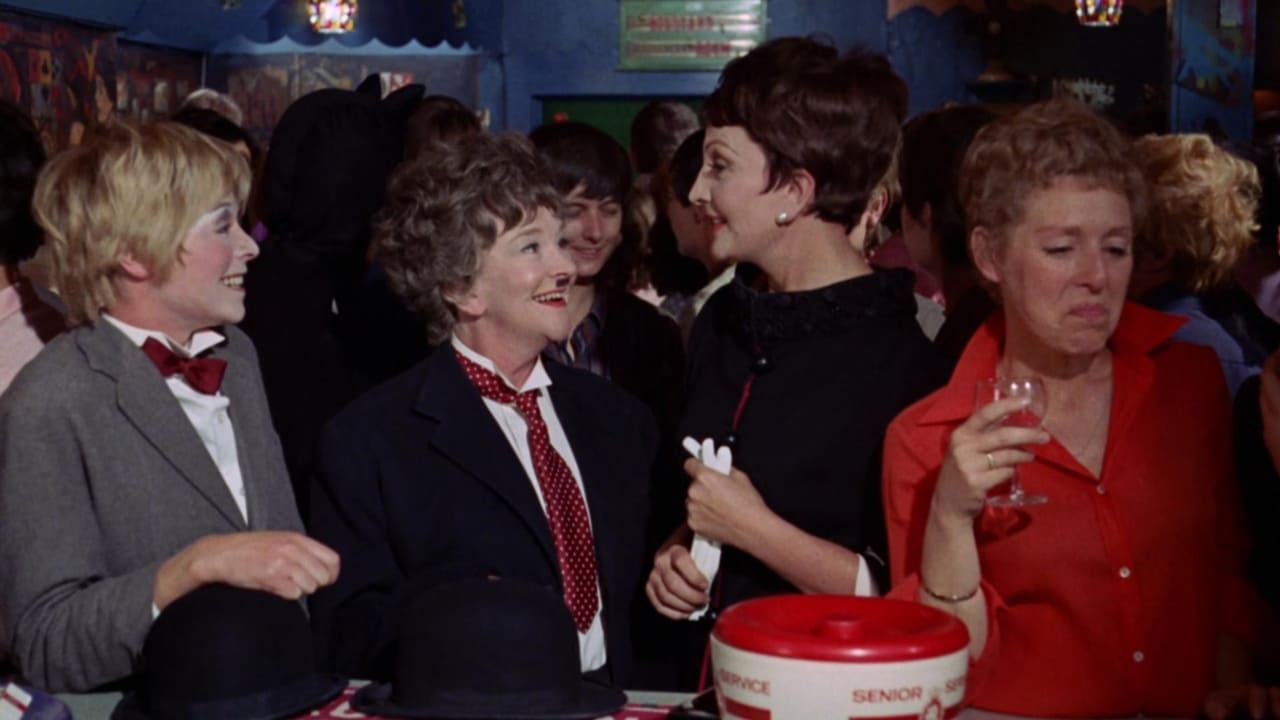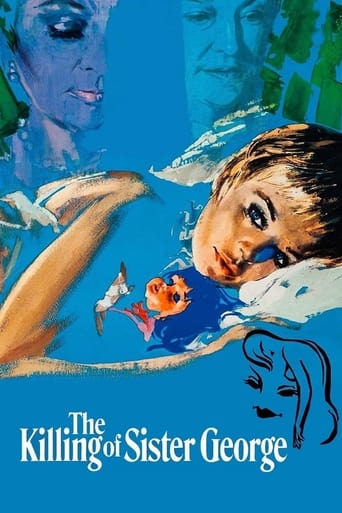

Beryl Reid gives the performance of a lifetime in this film about lesbian roommates, one of which is an actress. The main plot revolves around the possibility of Beryl Reid's character on a TV show being written off (the show.) Her relationship with roommate Susannah York is very interesting. But, suffice it to say, Beryl is very dominating, possessive, and demanding. She wants to know where she's been all the time and likes to throw her weight around. At middle age and with extra weight, she is no longer the beauty she once was, and, as someone points out to her late in the film, she is not the ideal desired sex object for young women. To describe this film with mere words really doesn't do the film justice. Granted Beryl's performance is the whole show. But the movie is an experience you're not likely to forget, especially with a love scene between two ladies near the end of it. Coral Browne is quite good and memorable in her role as well. But "The Killing of Sister George" belongs to Beryl Reid and this film's hard-to-find status is only hurting people's chances at seeing Ms. Reid at her best.
... View MoreI am very interested in pre-Stonewall gay life, and as such I was delighted to see this film. However, if I found it historically and cinematographically interesting, I didn't enjoy it per se. The George character is a lesbian that doesn't care to hide that she's a lesbian. She's not apologetic, which is good, but she also displays a certain number of traits which make it very difficult to like her: she seems to have no understanding of social norms or play. She's unable to conduct herself like an adult. She interrupts people at the bad moment, yells on her girlfriend and insults her in front of everyone, etc etc. She gets drunk all the time, and is a mean drunk. Why is she like that? You'll have the greatest difficulties to convince me that it is not some homophobic logic behind. Just the way the scene in the bar is filmed you understand from where the movie comes from: It is a film made by a heterosexual man for a (60s) heterosexual public. It is not by chance that she ends up alone, drunk and desperate. (read: The Celluloid Closet by Vito Russo...) In the end, I had heard that The Killing of Sister George and The Boys in the Band were two very homophobic movies made in the late 60s presenting gay people as desperate souls. I saw TBITB, and it went directly in my top 10 of all times movies, and I can argue against anyone who tells me it is homophobic. I tried to have the same take on TKSG, but I couldn't. While TBITB is a gay movie made by a gay man (not Friedkin, but Crowley) with gay people and for gay people (it used to be a play on Broadway), TKSG is a straight movie played by straight actors for a straight audience, and pretending to portray the life of lesbians as it is but failing miserably.
... View MoreA supremely entertaining film I thought, WAY ahead of it's time for the content and theme. The 'showdown' scene between 'Sister George' (Reid) and 'Mercy Croft'(Browne) was excruciatingly funny! a two way band of vitriolic hatred-the dialogue was bitchy and vitriolic in the extreme, overall an excellent movie that contains pathos/paranoia/jealousy/mind-games/spite and vast amounts of HUMOUR!! The fashions and locations are very 'period' of the time-Late sixties. A very good script that never let's you down-you almost can't wait for the next injurious insult/put-down to be heard-I truly believe the way those sentences were constructed were very over the top, but somehow very real and true to life - even now.
... View MoreThe Killing of Sister George (1968) THE KILLING OF SISTER GEORGE tells the story of June Buckridge, a middle-aged actress who portrays "Sister George" in a cosy weekly British TV soap opera called "Applehurst".In the show June, as "Sister George", is a sweet and charming District Nurse loved by all, but off-screen she has a more sinister side to her personality: she's a hard-drinking, foul-mouthed, cigar smoking lesbian, totally insecure in her relationship with the much younger Alice "Childie" McNaught (Susannah York).Into this insecure relationship arrives the spidery Mrs. Mercy Croft (Coral Browne), who indirectly gets June sacked from her television role and seduces June's lover into the bargain.Beryl Reid is sensational as June Buckridge. Using a wide variety of acting skills she makes the character completely her own. It's a memorable performance, but perhaps a bit too theatrical at times.Coral Browne fairs a bit better and simply oozes fake charm and arch superiority. She's positively malevolent. Her every line of dialogue and facial expression seem to drip with evil intent. What a great performance.Susannah York is a bit hard to take as "Childie". She's simply the wrong actress for the role because she appears to be too old and her personality is too "strong" for someone who is supposed to have been dominated by her lover.The film, directed by Robert Aldrich, will be a bit too full-on for most audiences. In the play on which the film was based, the lesbian relationship was only hinted at, never really mentioned. But in the film, however, Aldrich hits you over the head with it again and again.Be warned: the trip to The Gateways Club (a lesbian bar) maybe a bit too shocking even in this day and age for some viewers.A good film, but it could do with some pruning, but definitely worth seeing for Beryl Reid and Coral Browne's performances.
... View More